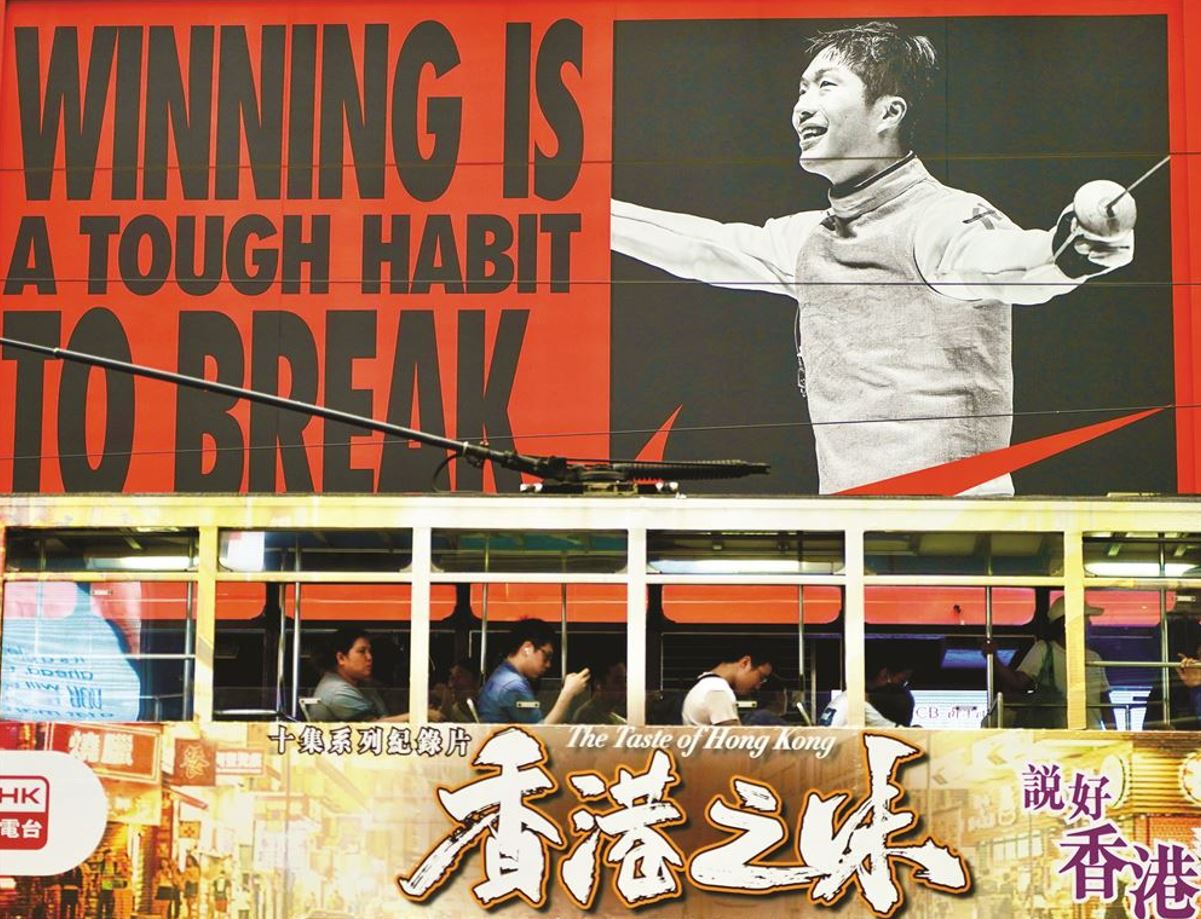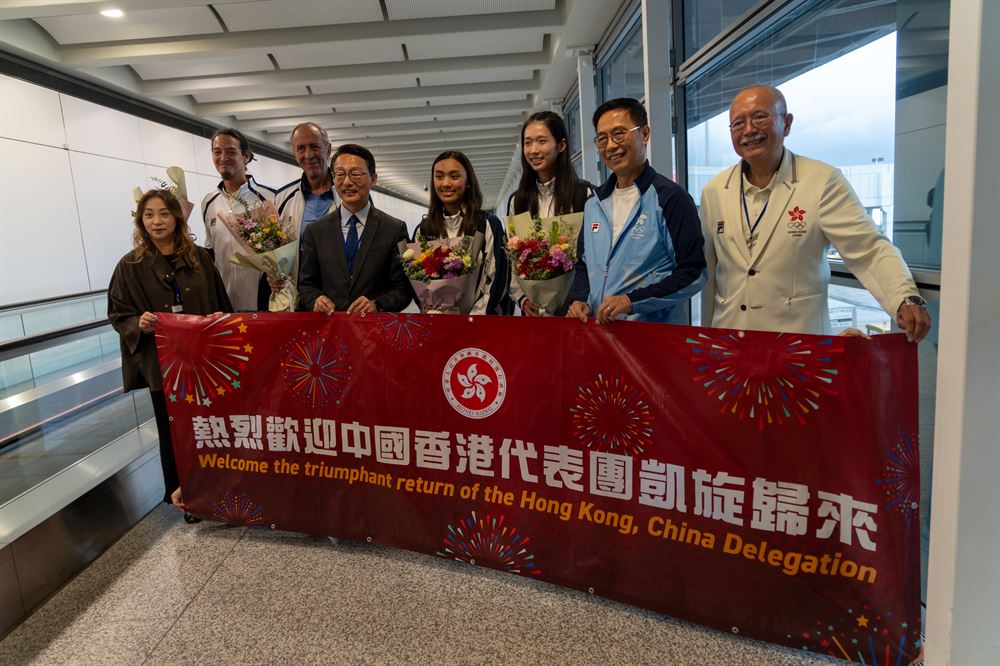
With Hong Kong Olympic gold medalist fencers Edgar Cheung Ka-long and Vivian Kong Man-wai making history in Paris, the city is filled with excitement. Sports enthusiasts have been packing shopping malls to watch live broadcast, staying late in bars and sharing their joy with friends at restaurants, boosting local business.
The splash caused by the 2024 Paris Olympic Games demonstrates the power of mega sports events in propelling economic growth — something the special administrative region government attaches great importance to as it works to put the economy back on track following the COVID-19 pandemic.
Hosting premier sporting events will promote the development of the sports industry, which refers to the manufacturing of sports goods, surfacing ideas with the business sector, media, technology and many aspects related to people’s daily lives.
Experts say a sound sports infrastructure, an active government role and long-term planning for the industry will amplify Hong Kong’s status in the international sports arena and attract more world-class sports events to the city. These goals require greater efforts.
To make itself a center for major global sports events, Hong Kong launched the “M” Mark system in November 2004 to encourage local businesses and residents to participate in and support such activities. Geared to accommodating spectacular and exciting sports events, the system applies only to key international sports projects organized by and staged in the SAR.
Efforts intensified last year when the government implemented a range of measures to make the program more attractive to participants. The incentives include raising the funding ceiling for each event from HK$10 million ($1.28 million) to HK$15 million; lifting the quota of “M” Mark events organized by each applicant annually; and making events organized by national sports associations, private and nongovernmental organizations eligible for funding under the program.

‘Let all stakeholders join’
Patrick Lau Wing-chung, a professor in the department of sport, physical education and health at Hong Kong Baptist University, calls the “M” Mark system a “good start” in extending financial support to organizers of such events, but stresses that money shouldn’t be the main focus. Instead, the government should play the role of a “key convener” by mobilizing stakeholders to join the sports cause and foster cross-industry collaboration.
“We need to understand that the sports industry isn’t confined to just a sports watch or a pair of sports shoes. It’s about a healthy lifestyle that involves everyone’s daily activities. It’s also about culture. So what we need to do is to get all industry stakeholders to participate,” he says.
He said he believes the government could serve as a “communicator, negotiator and problem solver” for stakeholders in various industries, including hotels, airlines, retailers and entertainment establishments.
ALSO READ: Sports feast for a proud city
Highlighting the importance of consistency, Lau calls for a five-year development plan for the sports sector to be formulated. “We have to come up with a mid- or long-term target for all parties involved to give them the confidence to invest every year. Ultimately, the government won’t have to spend too much money. The money will come from commercials.”
The scholar suggests that Hong Kong explore and invest in “young sports” — those that are still developing or new to Olympic Games, such as surfing, skateboarding, lacrosse and baseball.
“Compared with well-established sports events, Hong Kong has more opportunities to develop young sports as we aren’t that far behind. We should also preserve major sports activities in Hong Kong, such as the Hong Kong Sevens rugby tournament and the Standard Chartered Hong Kong Marathon.”

Hong Kong’s biggest problem at present is the lack of sports infrastructure, says Josselyn Chau, an assistant researcher of local think tank, Our Hong Kong Foundation. “A prerequisite for establishing our sports brands is a sound sports infrastructure, as well as supporting facilities like restaurants, hotels and transportation.”
Citing water sports, she says Hong Kong has the potential to build up its sports label in sailing as the city boasts a 1,200-kilometer-long coastline and a vibrant culture for water sports, with the Hong Kong Tourism Board using the sailboat as its logo. However, a shortage of water sports centers has impeded development.
In an attempt to fill the gap, construction of the city’s landmark Kai Tak Sports Park is underway. With a 50,000-seat main stadium, a 10,000-seat indoor sports center, a 5,000-seat public sports ground and about 14-hectare landscaped open space and other ancillary facilities, the park is expected to go into operation next year, beefing up Hong Kong’s strengths in holding major international sports events.

Seek deeper cooperation
Although Lau says it’s necessary to develop sports infrastructure, “there’s no need to do everything”. As a city with limited land area, Hong Kong should seek deeper cooperation with other cities in the Guangdong-Hong Kong-Macao Greater Bay Area.
Chau and Lau agree that the 15th National Games, to be held next year, will be a good test of regional collaboration, with Hong Kong due to host the track cycling, fencing, rugby sevens, beach volleyball, golf, triathlon, men’s handball and men’s under-22 basketball events, while other competitions will be staged in Guangdong province and the Macao SAR.
Chau says Hong Kong sports organizers could learn from the National Football League in the United States. “The NFL Super Bowl is one of the most watched sports events in the US. One important reason for its success is its halftime show featuring some of the most popular stars in the country. Hong Kong could also invite local stars and those from the Chinese mainland to its popular sports events. This would make local and overseas spectators more willing to spend, creating a vibrant fan culture.”
READ MORE: Unforgettable heroes
The value-added of Hong Kong’s sports and related activities, excluding taxes and subsidies on products concerned, reached HK$38 billion in 2021, accounting for 1.4 percent of the city’s total value-added at basic prices. About 74,000 people worked in the industry that year, making up 2 percent of the entire local workforce.
Atlas Shao contributed to this story.
Contact the writer at thor_wu@chinadailyhk.com


